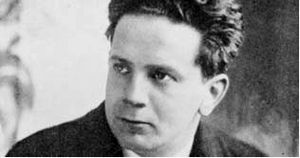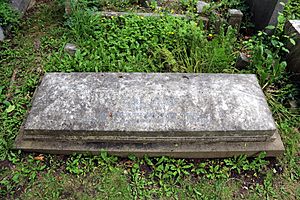Carl Mayer facts for kids
Quick facts for kids
Carl Mayer
|
|
|---|---|

Carl Mayer (c. 1920s)
|
|
| Born | November 20, 1894 |
| Died | July 1, 1944 (aged 49) London, UK
|
| Resting place | Highgate Cemetery, London |
| Occupation | Screenwriter |
| Years active | 1919–1940 |
|
Notable work
|
|
Carl Mayer (born November 20, 1894 – died July 1, 1944) was an Austrian screenwriter. He helped create some of the most famous silent films. He wrote or co-wrote movies like The Cabinet of Dr. Caligari (1920), The Last Laugh (1924), and Sunrise: A Song of Two Humans (1927). Many of these films were directed by F. W. Murnau. Carl Mayer was very important in shaping two major styles of German cinema: German Expressionism and Kammerspielfilm.
Contents
Early Life and Film Career
Carl Mayer was born in Graz, Austria. He later moved to Innsbruck and then Vienna, where he worked on plays for the theater. The events of World War I made him believe strongly in peace.
In 1917, Mayer moved to Berlin. There, he worked at a small theater called Residenztheater. He became friends with Gilda Langer, a main actress at the theater. Mayer wrote the script for The Cabinet of Dr. Caligari (1920) with Hans Janowitz. He hoped Langer would star in the film. However, she sadly passed away in 1920. The role then went to actress Lil Dagover.
Working on The Cabinet of Dr. Caligari led Mayer to work with many top directors in Germany. He worked with F. W. Murnau on Der Letzte Mann (1924), which is known as The Last Laugh in English. He also wrote the story for Murnau's film Sunrise (1927). This movie was made when Murnau was working in Hollywood. Mayer also helped write Berlin: Symphony of a Metropolis (1927) with Karl Freund and Walter Ruttmann.
Leaving Germany and Later Life
Carl Mayer was Jewish and a pacifist (someone who believes in peace). Because of this, he decided to leave Germany when the Nazi party came to power. In 1933, he moved to London to escape the Nazi regime. Before leaving, he worked with Béla Balázs on the script for Das Blaue Licht (1932).
In London, Mayer worked as an adviser for the British film industry. He became friends with important British film people, like director Paul Rotha.
Final Years and Legacy
In 1942, Carl Mayer was diagnosed with cancer. Towards the end of his life, he wanted to make a documentary film about London. However, it was hard to find someone to produce the film because of the war.
He passed away at the age of 49 on July 1, 1944. He was buried in the eastern part of Highgate Cemetery in London. His gravestone says: "Pioneer in the art of the cinema. Erected by his friends and fellow workers." The city of Graz in Austria has named an award after him to honor his contributions to film.
Selected Filmography
- Scherben (1921)
- Nights of Terror (1921)
- Hintertreppe (1921)
- Danton (1921)
- The Doll Maker of Kiang-Ning (1923)
- Earth Spirit (1923)
- New Year's Eve (1924)
- Fräulein Else (1929)
- The Man Who Murdered (1931)
- Ariane (1931)
- Dreaming Lips (1932)
- Dreaming Lips (1937)
- Dreaming Lips (1953, based on his original screenplay)
See also
 In Spanish: Carl Mayer para niños
In Spanish: Carl Mayer para niños


